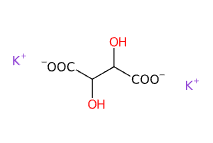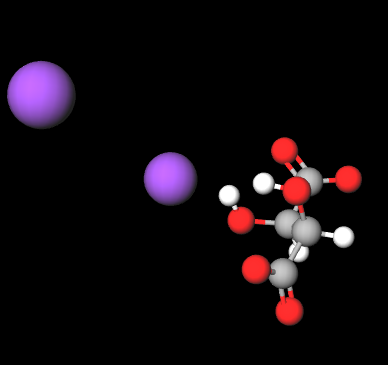Dipotassium tartrate a potassium salt of tartaric acid and bears the chemical formula K2(C4H4O6).
Il nome definisce la struttura della molecola.
- Dipotassium. "Di" indica la presenza di due atomi di un elemento, in questo caso, il potassio (K). Il potassio è un minerale essenziale che svolge un ruolo chiave in molte funzioni cellulari.
- Tartrate si riferisce al sale o all'estere dell'acido tartarico. L'acido tartarico è un acido organico che si trova in natura, ad esempio, nelle uve, ed è spesso utilizzato in cucina e in enologia.
Raw materials used in production.
- Key raw materials for the production of dipotassium tartrate include tartaric acid and potassium carbonate or potassium oxide.
Step-by-step summary of industrial production process.
- Tartaric Acid Extraction. Tartaric acid can be extracted from natural sources such as deposits found in wine barrels, or it can be synthesized.
- Neutralization. Tartaric acid is neutralized with a potassium base, such as potassium carbonate or potassium oxide, to form the potassium salt.
- Crystallization. The dipotassium tartrate solution is then cooled to allow crystals to form.
- Purification. The crystals are purified through various methods, such as recrystallization.
- Drying. The crystals are then dried to remove any remaining water.
Form and color. Potassium tartrate appears as white or colorless crystalline powder.

What it is used for and where
Food
Ingredient listed in the European food additives list as E336, acidity regulator.
Food Additive. Used as a stabilizer, pH regulator, and leavening agent in food and beverages.
Baking Products. Often used in baking products as a leavening agent, especially in combination with baking soda.
Wine. Used in the wine-making process to stabilize tartrate crystals.
It is also known as cream of tartar when used in cooking, particularly in the preparation of cakes and baked goods. It is soluble in water and has a slightly acidic taste. As a salt of tartaric acid, potassium tartarate has a variety of uses in the food and other industries, taking advantage of its stabilizing, pH-regulating and leavening properties. It is also a key component in some homemade wine-making kits, where it helps control crystal formation during the fermentation and aging process.
Pharmaceuticals
May be used in the manufacturing of pharmaceutical products as a stabilizing agent and for other purposes.
Cosmetics
Buffering agent. It is an iingredient that can bring an alkaline or acid solution to a certain pH level and prevent it from changing, in practice a pH stabiliser that can effectively resist instability and pH change.
Safety
Tartaric acid (E 334), sodium tartrates (E 335), potassium tartrates (E 336), sodium potassium tartrate (E 337) and calcium tartrate (E 354) are authorised as food additives according to Regulation (EC) No 1333/2008 on food additives. The Panel established a group ADI for l(+)‐tartaric acid and tartrates (E 334-337 and E 354) of 240 mg/kg bw per day, expressed as tartaric acid, by applying the total uncertainty factor of 10 to the reference point of 3,100 mg sodium tartrate/kg bw per day (the highest dose tested), that is approximately 2,440 mg tartaric acid/kg bw per day. Accordingly, the current ADI of 30 mg/kg bw per day is withdrawn (1).
 |  |
- Molecular Formula C4H4K2O6
- Molecular Weight 226.27
- CAS 921-53-9
- UNII O9WLL1ZL8S
- EC Number 203-490-6
- DSSTox ID DTXSID90889442
- IUPAC dipotassium;(2R,3R)-2,3-dihydroxybutanedioate
- InChl=1S/C4H6O6.2K/c5-1(3(7)8)2(6)4(9)10;;/h1-2,5-6H,(H,7,8)(H,9,10);;/q;2*+1/p-2/t1-,2-;;/m1../s1
- InChl Key AVTYONGGKAJVTE-OLXYHTOASA-L
- SMILES C(C(C(=O)[O-])O)(C(=O)[O-])O.[K+].[K+]
- MDL number MFCD00013065
- ChEBI 63018
- Nikkaji J7.170F
Synonyms:
- PotassiumD-tartratemonobasic
- Dipotassium tartrate
- Potassium tartrates
References_____________________________________________________________________
(1) EFSA Panel on Food Additives and Flavourings (FAF); Younes M, Aquilina G, Castle L, Engel KH, Fowler P, Frutos Fernandez MJ, Fürst P, Gürtler R, Gundert-Remy U, Husøy T, Mennes W, Shah R, Waalkens-Berendsen I, Wölfle D, Boon P, Tobback P, Wright M, Aguilera J, Rincon AM, Tard A, Moldeus P. Re-evaluation of l(+)-tartaric acid (E 334), sodium tartrates (E 335), potassium tartrates (E 336), potassium sodium tartrate (E 337) and calcium tartrate (E 354) as food additives. EFSA J. 2020 Mar 11;18(3):e06030. doi: 10.2903/j.efsa.2020.6030.


![]() Dipotassium tartrate
Dipotassium tartrate